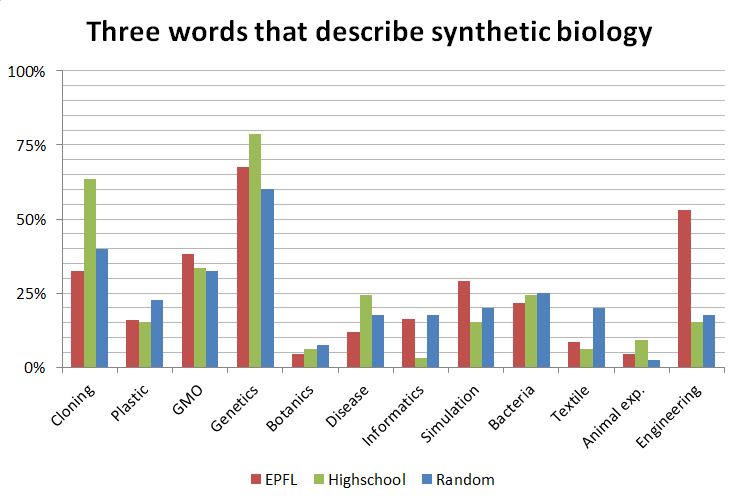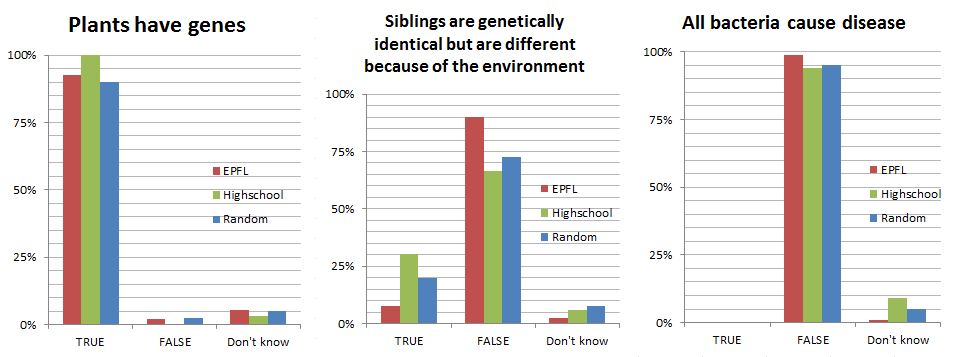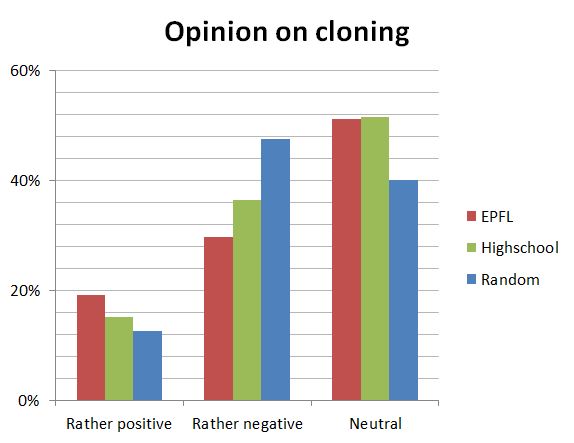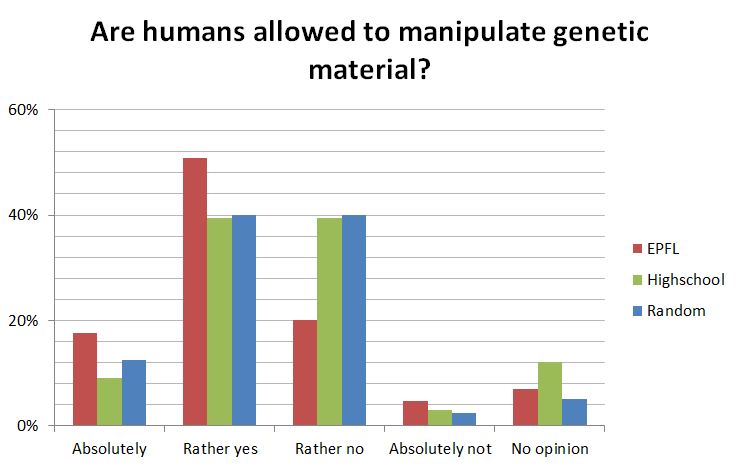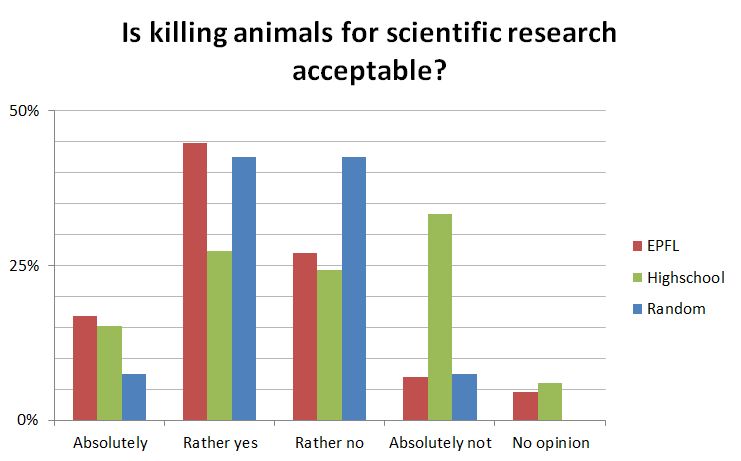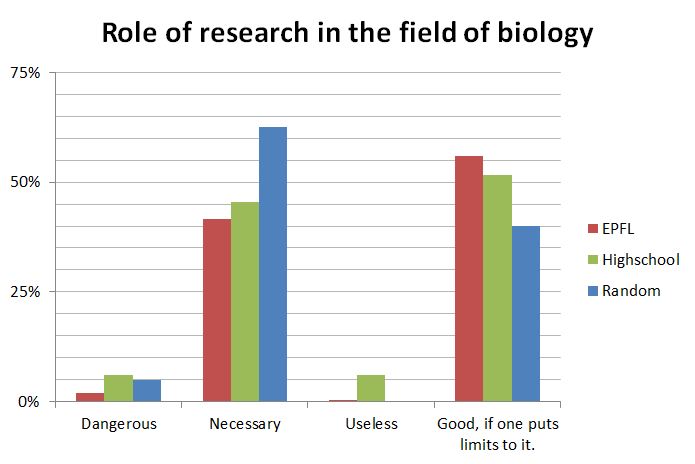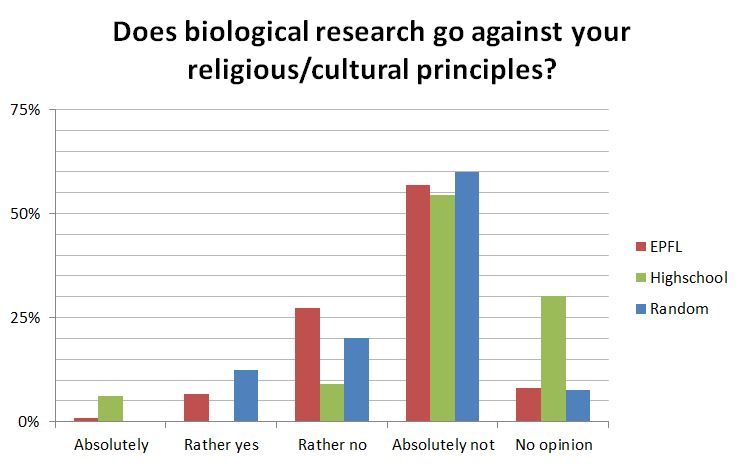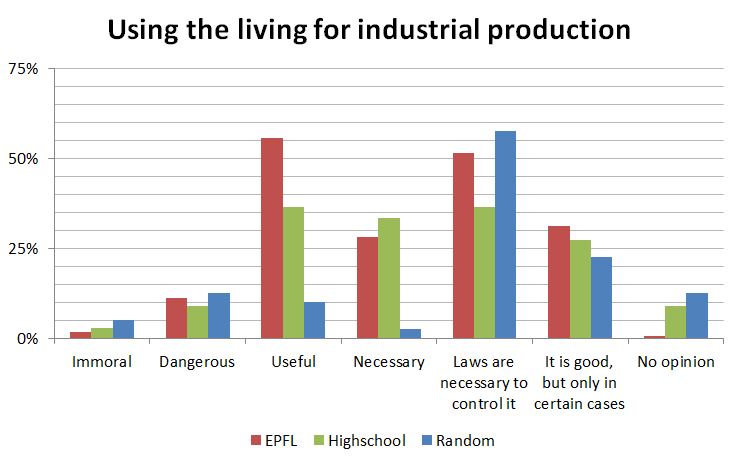Find the survey here.
Contents |
Three populations
We decided to analyze the answers coming from three distinct populations. The first one is a random population surveyed at the International Fair for Books and Press in Geneva, attended by people of all ages and backgrounds and from which we collected 40 surveys. The second population consists of second year high school students from Gymnase de Beaulieu Lausanne which have chosen a biological orientation (38 surveys collected) and the third population are students from EPF Lausanne (Bachelors and Masters) coming from all faculties (445 surveys, emailed at mailing lists and answered online).
The purpose of this analysis is to compare populations with differing levels of exposure to genetic engineering. A random population is less likely to have heard of synthetic biology than high school students with a biological-studies focus, and these high school students are less likely to have sufficient depth of study in the field when compared to EPFL students which are in an academic field.
The n for our three populations is very different for the EPFL students, since we were able to collect a lot more surveys by sending an online version of it to mailing lists. But since we are comparing percentages for each answer we are still able to see some significant differences between population. Furthermore, for the small n populations (Random and high school students) we had the possibility to have talks in person and collect opinions directly on the main subjects that may cause ethical issues (cloning, genetic manipulation, animal experimentation, GMOs, etc.).
Results
General knowledge
In order to evaluate the general knowledge our three populations have , we analysed 5 questions about basic genetics and biology.
The words "Genetics" and "Cloning" seem popular in all of the three populations when one mentions synthetic biology. The EPF Lausanne population is the only population to associate synthetic biology to engineering. It could be due to the fact that since iGEM is a well-known EPFL student project, other students assume that the subject must have a link with engineering.
These very basic questions in genetics show that every population has a quite good general knowledge about what organisms have genes, that not all bacteria are harmful (the media has helped by talking a lot on this subject). There was more confusion for the question on the genetic link between siblings, which is actually a trickier question than expected. Common beliefs tell us that our siblings are "the same blood" as we are and everyone talks about genes they have in common. Many people fell into this trap and answered that siblings have the same genes, thus are like clones, which obviously is incorrect. Even high school students made this confusion, even though they're oriented in a biological track, but maybe haven't seen that much genetics yet.
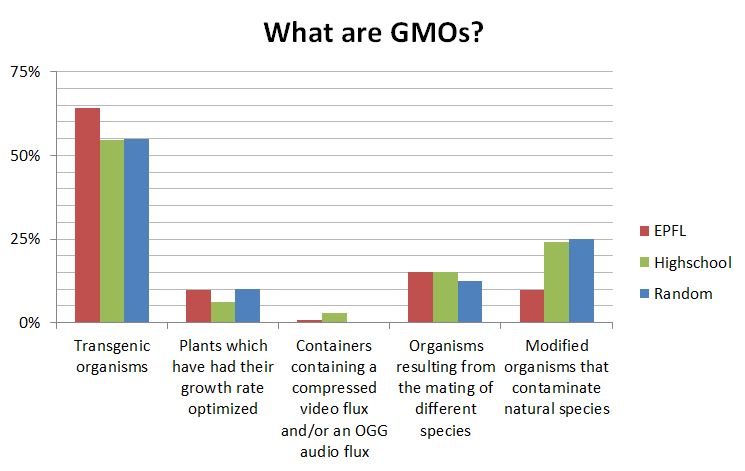
Ethic issues
The last 6 questions address ethical issues and fears people might have about cloning, genetic manipulation and using animals or other living organisms in industry or research.
When it comes to cloning, the opinions slightly differ between the three populations. The random population mostly has (at 47%) a rather negative opinion, followed by 40% of neutral opinions. Amongst the high school students, only 36% have a rather negative impression but more are neutral on the subject (51%). In the EPFL population as well, half the people are neutral (51%) but less answered rather negative (30%) and it is the population in which we have the most positive impressions (19% against 15 and 12% in the two others). Here we can see that the impression people have about the word cloning is linked to the likelihood to be informed on the different levels of cloning that exist. People who are not in contact with a scientific field are less likely to know of other and more common ways of cloning (gene, bacteria, etc.) than whole organism cloning in science fiction subculture or in the media (sects pretending to have cloned a human being etc.).
What is striking in the answers to this question is that the random and the high school students population are practically split in two, the rather yes and the rather no to genetic manipulation (both around 40%). There are very few clear answers such as "absolutely" or "absolutely not", which tells us that the subject is very open to discussions, since the vast majority does not have an absolute answer and tends only slightly towards one side or another. With the visibility of genetics fields increasing, people probably become more aware of what is and can be done, and that scientists manipulate genetic material for research. But at the same time we feel from the talks we had and from non-scientific people around us that the idea of manipulating genes is still a fear.
Again the random population is split between « rather yes » and « rather no » (both exactly 42.5%) but for high school students the opinions are a lot more diverse. In fact answers range from “absolutely” (15%) to absolutely not” and very interestingly this one was the most answered (33%), even though the students are biology oriented and chances are they already had to dissect animals in class and some of them are likely to continue in this track later at university. For the EPFL students, the answers are more in favor of sacrificing animals for research, with a vast majority of “rather yes” (45%) and the highest percentage of “absolutely” (16%) compared to the two other populations. About 27% still think “rather no”, but in general and probably due to closer contact with research institutes like the Swiss Institute for Experimental Cancer Research ISREC and others on campus using animal experimentation on a daily basis for research, EPFL students think that animal sacrifice is necessary to advance in those fields.
Even though opinions diverge more or less strongly on animal experimentation and genetic manipulation, when it comes to the role of research in biological fields, two answers stand out in all the populations: "Necessary" and "Good if one puts limits to it". Interestingly, between these two choices, EPFL students are the population where more people think that limits are necessary with 55% of the answers, followed by high school students with 51% and then the random population with 40%. Maybe amongst the random population, many people don't necessarily associate research (which is looked at as good for human kind and honorable) with genetic manipulation, animal experimentation etc. which are highly debated and controversial. Also we could think that the more a population is exposed to research, the more people will realise the need to have appropriate rules to limit things getting in "wrong hands", the same way medical doctors have a harder time putting trust in other doctors because they're more aware of their human side.
In all the surveyed populations, a great number of people answered that religion is absolutely not in conflict with their religious or cultural principles. This is not very surprising, given the fact that nowadays only few religions or subdivisions of a religion might condemn science. It is still relevant to think that religious or cultural belives have an impact on one's opinion on abortion or in vitro fecondation. But again it seems that most people associate biological research with cure against cancer and not directly to more touchy areas of medicine and research. Also even though, according to the Swiss Department of the Interior, only about 20% of Swiss people are officially irreligious, many Christian born people are actually either atheists or non-believing, which also adds to why religion is not an issue for accepting biological research.
The high school population seems to have the most equally distributed answers on the matter, whereas the random population mostly thinks that "Laws are necessary to control it" (57%) and "Good, but only in certain cases" (23%), as for the EPFL students the most popular answer was "Useful" (56%), which indicates that they are probably more informed on the applications of using living cells or other organisms in industry or more open to new ways to produce drugs. Again it is interesting to see that almost as many answered "Laws are necessary to control it" (61%) as well, which brings us again to the thought that the more someone is exposed to a field the more he knows and consequently the more he is aware of dangers.
Comparison with 2009 EPF Lausanne team
The 2009 EPF Lausanne team also studied people's opinions on the same questions. The survey they wrote is very similar to ours, expect we added more choices for the last diploma obtained, age and an "I don't know" field for the knowledge questions. The rest of the questions was left the same in order to compare our results with those 3 years ago. Though the issue with comparing is the difference in populations, since the 2009 team also had way more answered surveys from EPFL students than from random people. We decided to split populations to avoid that answers from people coming from a non-scientific field get drowned. We can actually observe that the answers from EPFL students made their graphs look very much like ours for the EPFL population.
Conclusions
From our analysis of three populations differentially exposed to scientific fields, we can observe an increase in knowledge or intuition about what synthetic biology is, though it is still a field that doesn't seem to be well known, even in scientific milieus.
- The general knowledge is better in EPFL students, but surprisingly the difference with the two other populations is less than we would have expected.
- The word "cloning", which is a very mediatised word still primarily means "Duplicate a human being or an animal" to many people. Other meanings of the word stay unknown to most people that are not in a genetic field.
- Especially young students between 15 and 18 feel very strongly about animal experimentation. This subject generates a large spectrum of opinions.
- People are quite well informed about GMOs, which tell us that the media play a crucial role in the knowledge, misinformation and fears people might have on a given subject.
- Genetic manipulation is more accepted in populations that are in contact with the field, but they also are more aware of the importance of rules and limits in science.
 "
"
